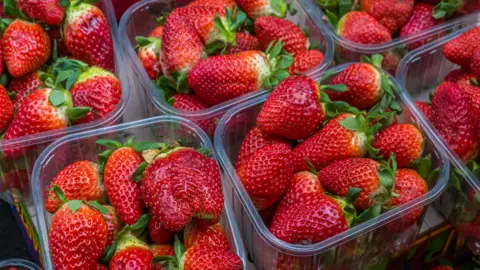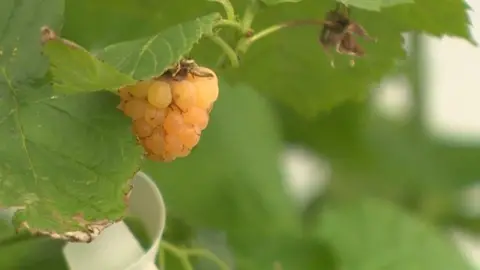Is fruit-growing ripe for opportunity in Wales?
 anutr tosirikul/Getty Images
anutr tosirikul/Getty ImagesSheep and cattle farms dominate the agricultural landscape in Wales, but experts predict there could soon be a marked rise in fruit and vegetable production.
It's down to a combination of factors that include Brexit, climate change and a rise in vegan diets.
Currently, only 0.08% of Welsh farmland is used for horticulture.
But one farmer who has started growing soft fruits said he thought it could "take off" across the country.
Tom Higgs, from Rhossili, on the Gower Peninsula said he saw his new pick-your-own business as "an insurance policy".
"It's so we're not so reliant on subsidies, and the price we're dictated to for beef and lamb," he said.
"I'd never grown a strawberry until this year - it's been a sharp learning curve but good fun."

The Welsh Government's Farming Connect programme, which advises farmers, says Wales has the potential to develop a thriving horticulture industry.
It supported Tom by paying towards the costs of an adviser to help set up his new enterprise.
"We've been encouraging farmers to add an extra string to their bow because there are uncertainties on the horizon as we all know," said Dr Delana Davies, knowledge exchange officer for Farming Connect.
They include fears over the future for meat exports after Brexit, and calls to cut livestock numbers to address greenhouse gas emissions from farms.
Chris Creed, from agricultural consultancy Adas, said there were definitely parts of the country where farmers would need to "stick to beef and sheep" but there was still "a lot of potential" for horticulture.
"I don't see the real big jump into sort of supermarket-type production but certainly on the farm tourism side I think there is a great deal of scope."
"With social media we've found there's a great interest with the public coming out to farms and we need to try and capitalise on that really."
As well as soft fruit and vegetables, he said farms could diversify into speciality crops like Christmas trees and pumpkins, describing it as a "fantastic opportunity".
Latest figures from the Welsh Government show the amount of land used for horticultural activities, excluding potato cultivation, has increased from 1,301 hectares in 2010 to 1,599 hectares in 2018.
Over the same period, the amount of land used for orchards and small fruits increased by 25% to 790 hectares.
New technology could mean farmers may not even need to free up land to grow fruit and vegetables, and could use existing outbuildings.
Gareth Jones, chief executive of Digital Farming in Bridgend, was at last week's Royal Welsh Agricultural Show educating farmers about the potential of hydroponics - growing crops without soil.
"We replace it with matting, feed water and nutrients to the roots, and use very high efficiency LED lighting. You can do it indoors, in barns or outbuildings that are unused," he explained.
He said there was huge interest in growing so-called micro-greens and micro-herbs in this way - used as garnishes on meals or to add flavour.
"It's a tool that can be used in many different ways - it won't replace traditional agriculture but it could mean we stop importing more of our food, start growing it instead and eventually exporting more of it too."
